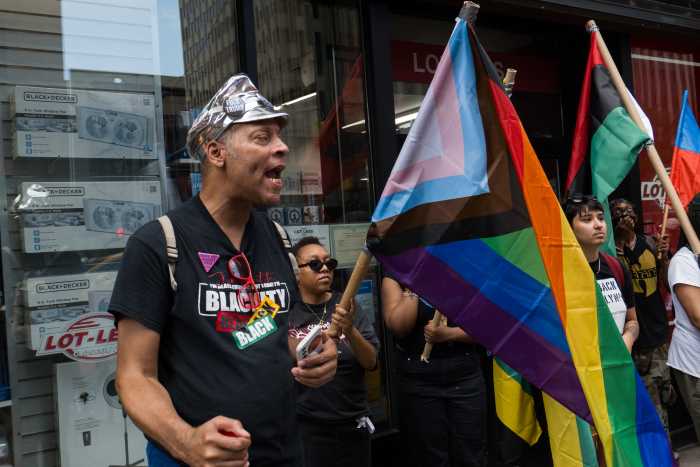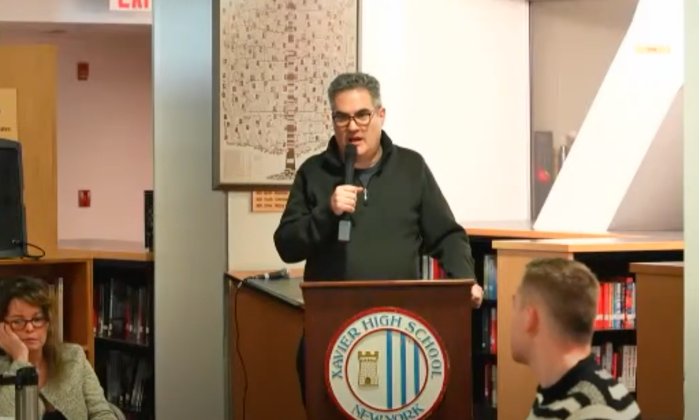In an Aug. 28 Friday Forum hosted by FIERCE, the Chelsea-based advocacy group for LGBTQ youth of color, District 3 City Council candidate Yetta Kurland repeatedly signaled her personal identification with the struggles those young people face.
One of her opponents, Maria Passannante-Derr, who has at times clashed with the group in her role on Community Board 2, voiced her respect for FIERCE’s goals, even as she challenged them to aggressively seize opportunities already available to impact policy debates.
The third candidate in the race, City Council Speaker Christine Quinn, who has served the district since 1999, did not attend, citing a scheduling conflict.
FIERCE, which stands for Fabulous Independent Educated Radicals for Community Empowerment, focused the discussion on its ongoing efforts to preserve and enhance the West Village and Hudson River piers as safe havens for LGBTQ youth, many of whom travel from other parts of the city and region to socialize openly with their peers. The questions, posed by FIERCE members Elegost Rosado and Chris Baez, probed the candidates’ views on tensions between youth on one side, and neighborhood residents and police on the other, as well as recurring debates about expanding the hours, access and services available for young people on the piers.
An out lesbian who mentioned she is 41, Kurland, a civil rights attorney, established from the start a rapport with fellow LGBTQ community members roughly a generation younger. As part of its effort to embrace youth of varying gender identities, FIERCE typically asks speakers at its events to state their “preferred gender pronoun” or PGP, by which they wish to be identified. Passannante-Derr, also an attorney, was initially caught off-guard by the question, saying she wanted to be called “Maria.” Prompted again, she said that “her” is her PGP. Kurland answered the same question by saying audience members could apply any gender identification to her they wished, adding later, “I am in a lot of ways gender-nonconforming.”
Passannante-Derr, at other points, was proactive in embracing goals in line with FIERCE’s agenda. She called for an inspector general in the public schools to investigate harassment and discrimination against queer students, said she “firmly believes” any redevelopment approved at Pier 40 off W. Houston St. will include a 24-hour drop-in center for LGBTQ young people, and pledged that if elected to the Council she would make discretionary “member item” money available to the group.
Kurland seconded her opponent’s commitment on Pier 40, and on many broad policy questions the two candidates largely hit the same notes. Many of their differences emerged when they got down to specifics. On several occasions, Kurland emphasized two leading themes of her campaign—that choices need not be made between polarized options, and that public decision-making must be more open and transparent. Speaking to the simmering tensions in recent years between LGBTQ youth of color and more affluent and less racially diverse neighborhood residents, she said, “I want to find a way for us to dialogue better with the greater community. I think we’ve been put into a false dichotomy where it’s the bad kids versus the bad community residents, and I don’t think that really exists, and the way we’re going to do that is to roll up our shirtsleeves, with respect for all of us.”
At the same time, Kurland argued, the process in place for approving how land regulated by the city, such as the piers, can be used—governed by the Uniform Land Use Review Procedure (ULURP)—disenfranchises certain portions of the community, in this case, the FIERCE constituency. “The ULURP system that happens now often times excludes community involvement,” she said. “We need to find creative ways to bring everyone to the table.”
Passannante-Derr took great exception to Kurland’s assertion. “I disagree with your first statement that the ULURP process is not all-inclusive of the community,” she said, pointing out that approval is generally an eight-month effort that involves numerous levels and agencies of government, all of them open to public input. Expressing her confidence that a 24-hour drop-in center at Pier 40 could and should result from the process, she said, “With your support and your participation—at the board, at the borough president level, at City Planning and the City Council—that will happen. But you have to be at the hearings with your testimony… It’s a lot of work.”
FIERCE challenged Passannante-Derr to explain why, during the debate several years ago about the Christopher St. pier’s curfew, she supported the relocation of the LGBTQ night scene to Pier 54 at W. 13th St., which the group said was out of the way, less safe and inherently a temporary fix, given the likelihood of redevelopment there. The candidate responded that the proposal “was not in any way disrespectful,” but rather aimed at opening up space for young people wishing to stay out later than 1 a.m. Ending discussion of the topic in something of a stalemate, Passannante-Derr said, “If it’s still unacceptable, I’d like to know why it’s still unacceptable.”
But when asked about opportunities for making more affordable food available at Pier 45, just north of Christopher St., Passannante-Derr laid the responsibility back at FIERCE’s feet. “Why don’t you start something down there?” she asked. Then, recalling that the group is a non-profit, she added, “Maybe you could have a separate, for-profit organization that would provide food down on Pier 45.”
Desireé Marshall, the evening’s “referee,” read an e-mail from Quinn expressing her regret at missing the event and recalling efforts her office had worked on with FIERCE in recent years. Kurland, in turn, used regretful tones in noting the Council speaker’s absence. “I am saddened that she is not here,” she said of Quinn. “LGBTQ youth have been ignored for too long. And you deserve to have all three of the candidates here tonight… We need our elected officials listening better.”
Passannante-Derr passed on that chance to swipe at Quinn, but later said, “Years ago I supported Chris. I thought she was a reformer.”


































